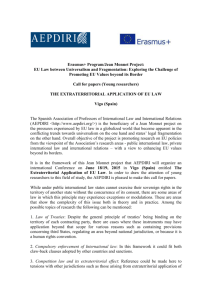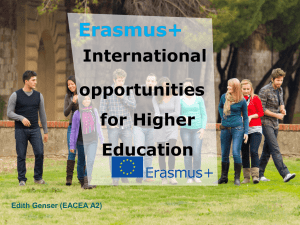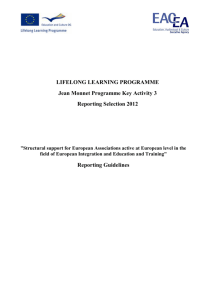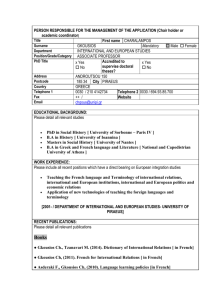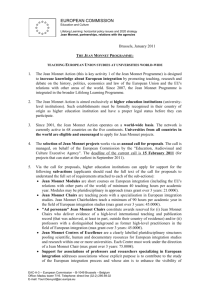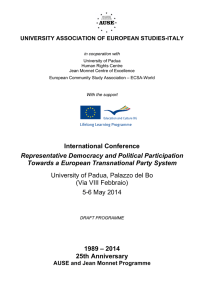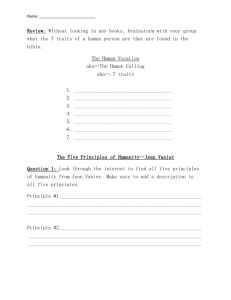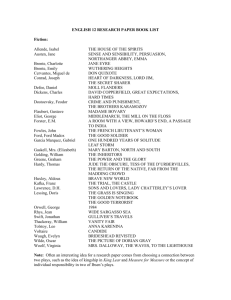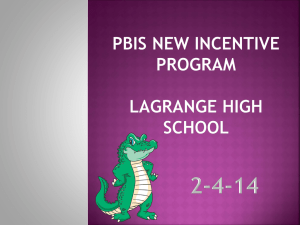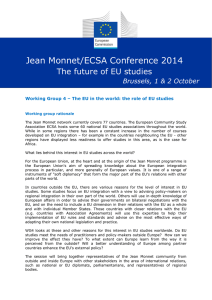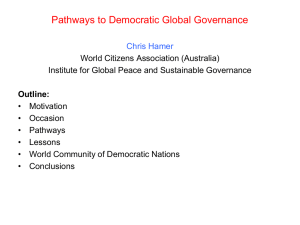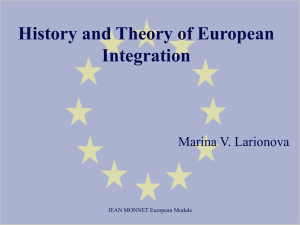Jean Monnet Activities 2016 clean
advertisement
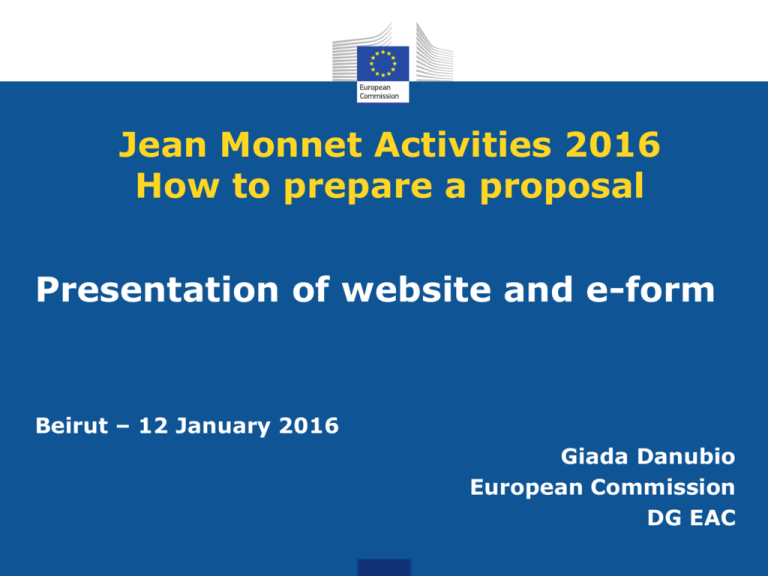
Jean Monnet Activities 2016 How to prepare a proposal Presentation of website and e-form Beirut – 12 January 2016 Giada Danubio European Commission DG EAC The announcement of the Erasmus+ programme Call for proposals 2016 — EAC/A04/2015 in all official languages of the EU was published on 22/10/2015 in Official Journal No 2015/C 347/06. • The deadline for Applications for Jean Monnet Activities EAC/A04/2015 is on 25 February 2016. • Apply directly to Executive Agency (EACEA) • Application via eForm and attachements • EACEA Education, Audiovisual and Culture Executive Agency website • https://eacea.ec.europa.eu/erasmusplus/funding/jean-monnet-activities-2016_en • • • • • Call notice Guidelines How to apply Eforms Annexes STEPS • 1. Before starting your application read carefully a) the Call for proposal b) the Programme Guide 2. Before starting your application create your ECAS account and your Participant Identification Code (PIC) 3. Submit your application using the eForm 1. Before starting your application Read carefully a) the Call for proposal b) the Programme Guide You will find there all the instructions for completing the Application Package carefully a) the Call for proposal Call for proposals 2016 — EAC/A04/2015 — Erasmus+ programme General information on: • • • • • Objectives Actions Eligibility Budget and duration of projects Deadline for the submission of applications • Full details b) the Programme Guide b) the Programme Guide The Erasmus+ Programme Guide (available online) presents all actions covered within the new Erasmus+ Programme, including the Jean Monnet Actions, and explains the rules and conditions for setting up and submitting an application. http://ec.europa.eu/programmes/erasmusplus/discover/guide/index_en.htm In the Programme Guide: JEAN MONNET ACTIVITIES from page 192 • • • • • • • • WHICH ACTIONS ARE SUPPORTED? WHAT ARE THE AIMS OF JEAN MONNET? JEAN MONNET MODULES* JEAN MONNET CHAIRS JEAN MONNET CENTRES OF EXCELLENCE JEAN MONNET SUPPORT TO ASSOCIATIONS JEAN MONNET NETWORKS JEAN MONNET PROJECTS • *see next slide JEAN MONNET MODULES • • • • WHAT IS A JEAN MONNET MODULE? WHICH ACTIVITIES ARE SUPPORTED UNDER THIS ACTION? WHAT IS THE ROLE OF ORGANISATIONS PARTICIPATING IN A JEAN MONNET MODULE? • WHAT ARE THE CRITERIA USED TO ASSESS A JEAN MONNET MODULE? ---Eligibility criteria • WHAT ELSE SHOULD YOU KNOW ABOUT A JEAN MONNET MODULE? ---Budget allocation, Dissemination and Impact, Funding rules 2. Second step before submitting your application: Applicants must have an ECAS (European Commission Authentication Service) account. For practical details on how to create the ECAS account, please consult the presentation on the EACEA website: http://ec.europa.eu/visits/documents/ecas-stepby-step_en.pdf and… …and The applicant organisation* must be registered in the Participant Portal and receive a Participant Identification Code (PIC) This PIC is a number that will be used as a reference by the Commission in any future interactions. A single registration is required for each organisation in the system. Which kind of information? See Call for Proposal *and for the Jean Monnet Networks also the partner institutions involved For practical details on how to use the Participant Portal, please consult the presentation on the EACEA website: • https://eacea.ec.europa.eu/sites/eaceasite/files/participant-portal-eform.pdf 3. Submit your application using the eForm - Create your official electronic application form, also called the eForm (No paper copy is required) - Fill in the eForm, attach completed versions of the compulsory annexes and validate it -If your application is complete, you can submit it online - You will then receive a confirmation email and reference number. If not, contact the helpdesk. MORE INFORMATION – JEAN MONNET • Erasmus+ Programme Guide and 2016 General Call for proposals: http://ec.europa.eu/programmes/erasmus-plus/discover/guide/index_en.htm • Jean Monnet Activities: http://eacea.ec.europa.eu/erasmus-plus/actions/jean-monnet_en • Funding - Jean Monnet Activities within Erasmus+: http://eacea.ec.europa.eu/erasmus-plus/funding_en • Jean Monnet Directory: https://eacea.ec.europa.eu/JeanMonnetDirectory/#/search-screen/ • Jean Monnet selection results: http://eacea.ec.europa.eu/erasmus-plus/selection-results_en • Mailbox Jean Monnet: EACEA-JMA@ec.europa.eu Jean Monnet – Activities overview Max. community grants (of total budget): 75% - 80% *Flat rate financing system Type of Activity Amount EUR Jean Monnet Modules* 30.000 EUR Jean Monnet Chairs* 50.000 EUR Centres of Excellence 100.000 EUR Jean Monnet Networks 300.000 EUR Min. N° of countries Duration 1 3 years 3 3 years Jean Monnet Projects* 60.000 EUR 1 12-24 months Support to Associations 50.000 EUR 1 3 years 15 Erasmus+ Example - Jean Monnet Module in European Banking and Financial Integration in EU, 2007-2010 Universitatea Alexandru Loan Cazu Iasi, Iasi, Roumania Prof. Stefura Aims: Due to the great demand for accurate information regarding the European integration process and to its position in the social environment, the UAIC Iasy can and must act like a leader in bringing Europe closer to the citizens and highlighting the implications of this process Target groups: Students, teachers, trainers, civil society Activities: Course on European Banking and Financial Integration, to train future European citizens in Romania Information about European economic integration at postgraduate level Promote and strengthen active European citizenship through understanding that the economic impact of enlargement will be significant as a bigger and more integrated market boosts economic growth Promote the active participation of students/citizens in the process of European integration through reflection and debate on the various economic aspects of this process. Example - Jean Monnet Chair in European Integration and Youth 2010-2014 National University of Ireland, Maynooth Dr M. DEVLIN Aims • To respond to unprecedented increase in emphasis on youth policy at EU level in recent years • To consolidate and expand European integration studies for youth and community work students at the National University of Ireland, Maynooth • To explore ways of furthering the European dimension in vocational and professional youth and community work, education and training Activities • Lectures, including a module for vocational and professional students • Doctoral seminars • Training course for civil society groups Target groups • Higher education institutions at national level, civil society groups and organisations and academics and students from outside the EU • gathering together academics and practitioners working in the field of youth studies • Thank you • for • your attention
